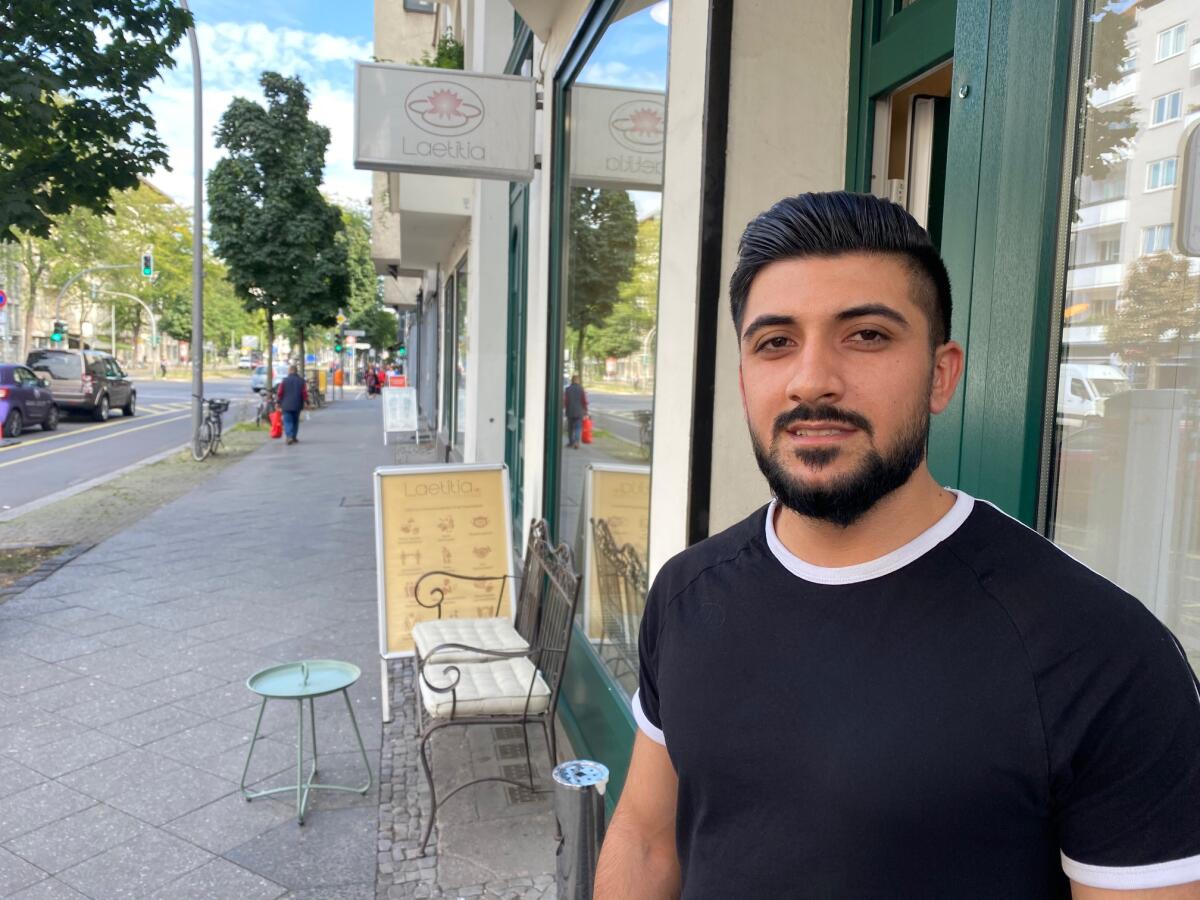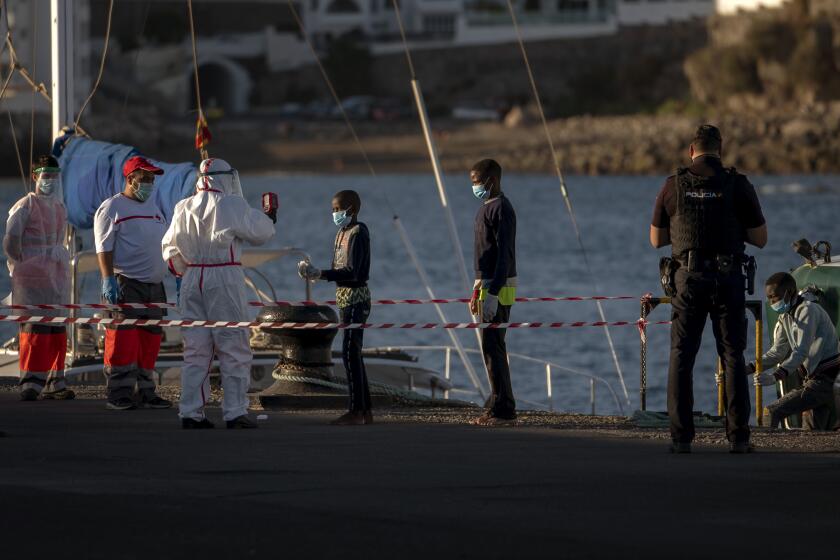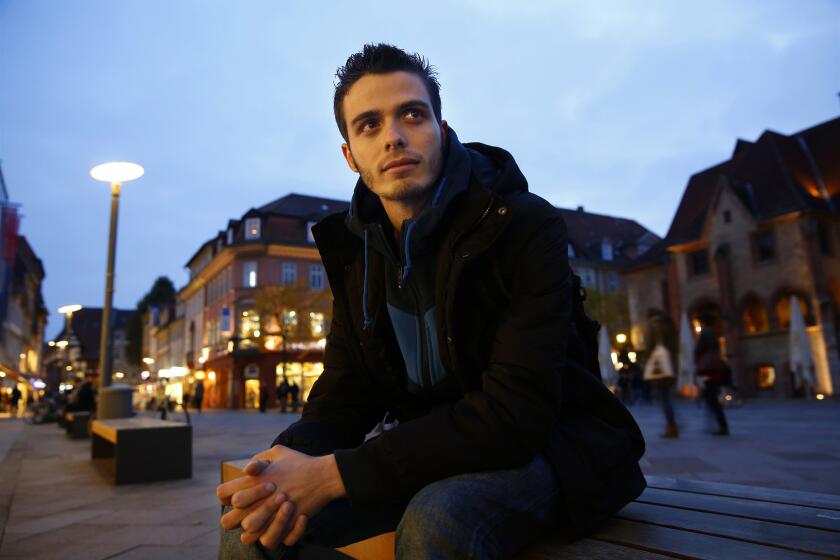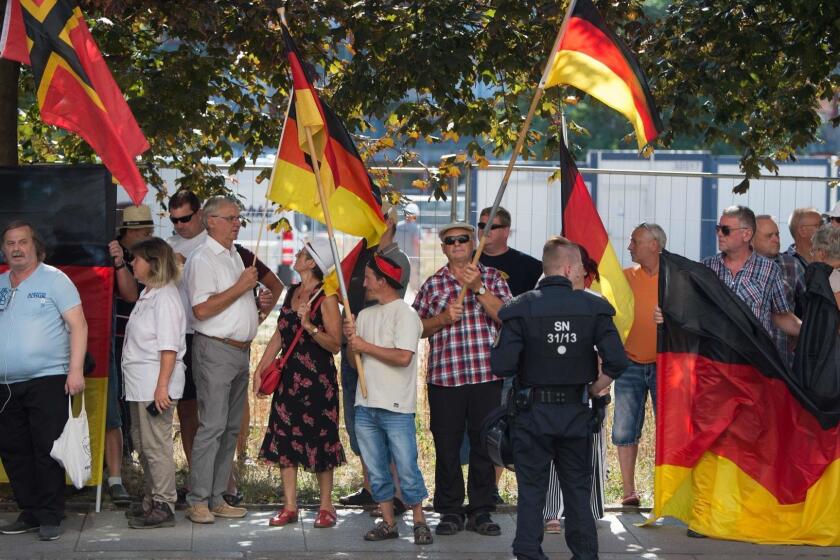He took this selfie with Angela Merkel in 2015. Their lives, and Germany, changed
- Share via
BERLIN — The selfie that changed both his life and Angela Merkel’s was snapped soon after Rodin Saouan arrived in Berlin in 2015. He’d spent more than a year trying to reach Germany from war-ravaged Syria, traveling on foot, by car, bus, truck and tractor and aboard an unseaworthy rubber dinghy packed with 44 refugees making the perilous crossing from Turkey to Greece.
Exactly five years ago Thursday, Saouan suddenly found himself standing just a few feet from Merkel, who had dropped by a refugee center in Berlin on an unannounced visit. With a smartphone in his hand and a smile on his face, Saouan, then 25, approached Germany’s chancellor, signaling hopefully that he wanted a picture together.
“My German wasn’t very good at the time, so all I could say was ‘Guten tag,’” Saouan recalled in an interview with the Los Angeles Times. “She was just standing there with several bodyguards and staff workers and looking a little bit nervous. But she smiled at me and let me take the selfie.
“I was a little surprised it was possible. She then asked me where I came from, and I told her from Syria.”
Photos of the two posing together were featured on newscasts and in newspapers around the world. For Saouan, the improbable encounter inaugurated his new life in a foreign but peaceful land far from his original home. For Merkel, it became a symbol of her surprising decision, just a few days earlier, to abandon her usual caution and put out the welcome mat for what eventually became an influx of 1.1 million migrants and asylum seekers in Germany that year.
The move was initially hailed as a moral triumph for a country burdened with a dreadful history of fascism and genocide. Then came the backlash, against Merkel, her party and some of the new arrivals themselves, as the practical challenges of sheltering and integrating so many people grew apparent. U.S. presidential candidate Donald Trump accused Merkel of “ruining Germany,” her popularity plunged, allies of her conservative party lost elections and right-wing dissent — some of it violent — surged.
Migrants and asylum-seekers are increasingly crossing a treacherous part of the Atlantic Ocean to reach the Canary Islands, a Spanish archipelago.
But five years later, the situation has settled to a significant degree as Germans set about absorbing the newcomers with their trademark pragmatism. Though there have been missteps and continued criticism that Germany has been overwhelmed by the new arrivals, and though far-right sentiment lingers, Merkel’s approval ratings have hit new heights, in part because of her able management of the COVID-19 pandemic, and tensions over the great in-migration of 2015 have largely eased, analysts say.
“What is striking is the perception in Germany and that the public has settled on a surprisingly positive narrative,” said Gerald Knaus, director of the European Stability Initiative think tank in Berlin and an advisor to Merkel on refugee issues. “The consensus two years ago looked more controversial. But now two years on, the mainstream opinion is that it all worked surprisingly well.
“Most Germans are content and proud of what they’ve done,” Knaus added. “And that’s a very important signal for democracies.”
In a poll last month, a majority of Germans said their country had accepted the right number of refugees or should have taken in even more. Overall, Germany welcomed more asylum seekers and migrants in 2015 — during Europe’s biggest migration crisis since World War II — than the rest of the 27 European Union member states combined.
Saouan, now 30, can’t understand the heat that Merkel took, including over his famous selfie with her, which critics said only encouraged more people to strike out for Germany from such countries as Syria, Iraq and Afghanistan.
“She was only helping people in a tough situation who needed help,” Saouan said. “What’s wrong with that?”
His adjustment to life in Germany hasn’t been without difficulty. After the relief of making it safely to what seemed the promised land, he and other migrants found themselves navigating a country with a tough language to learn and with such a bewildering abundance of rules and regulations that even applicants for work as a waiter or dishwasher need certificates documenting their training or skills.
Saouan now speaks German reasonably well, and tries to improve by watching lessons on YouTube. Although he has passed a series of proficiency tests that qualify him for various jobs, he’s bounced through a series of low-paying, part-time positions in pubs, restaurants and warehouses as well as undergone some bouts of unemployment.
“I had a part-time job as a barman and cook in a restaurant until March 1, but then the coronavirus came, and so I haven’t had much work since,” said Saouan, who lives in a small studio apartment that costs $500 a month.
“I’m hoping to find a good job with good pay and a real employment contract. The jobs I’ve been doing just don’t pay enough for the rent and everything else. I want to earn enough to take care of myself, but it’s a lot harder than I thought it was going to be.”
Sometimes he sneaks the old family photo down to his room because he likes it so much, even though it was taken long before he was alive, and even though it’s not his family.
Then there’s the bass note of homesickness that never quite fades. As an able-bodied young man, Saouan fled Syria out of fear of being recalled to the army to fight in the country’s brutal civil war, which went “against everything inside me.” His four brothers and sisters remain in their farming village near Damascus.
“I didn’t have a future in Syria,” he said. “But maybe I don’t have one in Germany either. Don’t get me wrong — I’m happy and glad to be here, away from the war. Germany has been very kind to me, but I don’t have any family here. … I’d like to find a woman I could marry and have children with. I’d like to meet someone with the same culture and religion. That’s important to me.”
Opponents of Merkel’s policies bemoan what they say is a lack of assimilation, as well as the competition that newcomers pose in Germany’s economy — which remains Europe’s biggest despite the pandemic.
“Millions of refugees have arrived in Germany but without any kind of integration into the labor market. One-quarter of the Syrians living here are on welfare,” Alice Weidel, the co-leader of the anti-immigrant party Alternative for Germany, said in parliament last week. “The heightened competition for housing and jobs among low-skilled workers has become a major burden, as have the added burdens on our social welfare system.”
Ingolf Koecher and his wife, Bettina, have marched in 120 anti-Islam rallies in the former East German city of Dresden during the last four years.
Critics also accuse Merkel of recklessly endangering Germans’ safety. They point to several high-profile crimes committed by migrants, including a large number of sexual assaults in Cologne during outdoor New Year’s Eve celebrations in 2015, several grisly murders and a handful of terror attacks.
Anger fueled by such incidents resulted in a series of losses for Merkel’s party in regional elections from 2016 to 2018. Under growing pressure, Merkel herself — who has governed Germany since 2005 — announced in late 2018 that she would not seek a fifth term as chancellor in next year’s election and gave up her post as chairwoman of the Christian Democratic Union party.
Hostility toward asylum seekers has at times found violent expression. Some refugee centers were torched, and xenophobic hooligans beat up people who appeared to be foreigners. Anti-immigrant protests still crop up, often in eastern Germany, such as the city of Dresden. A number of refugees, weary of the resentment or of the stresses of living in such an unfamiliar environment, have gone on to other countries or returned to their homelands.
Here in more cosmopolitan Berlin, Saouan said he has not been subjected to any overt racism or resentment. The same goes for Mohamed Rachid, whose family, from the devastated Syrian city of Aleppo, spent more than a year in a refugee camp in Turkey before being taken by smugglers, at dawn, on a treacherous five-hour boat ride to Greece in August 2015.

Rachid arrived in Germany as a 16-year-old with his parents and four siblings — and little knowledge of his new host country. Now 21, he speaks German fluently, is a hard-working and well-liked trainee at a busy Berlin barbershop and evinces a confidence, optimism and determination that not many native Germans his age seem to possess.
“My dream is to open my own shop in a couple of years,” Rachid said. “I’ve got another 11 months to go as an intern here, and then I’ll work in a hair salon for two or three years to save up as much as I can, and then hopefully I can open up my own shop. I’m sure it’s all going to work out well.”
Knaus, the think tank director, said stories like Rachid’s are more typical among younger migrants with strong family networks around them. He said that 50% of Germany’s refugees have either found a job or enrolled in school or a vocational training program.
Rachid and his two sisters, who have internships of their own at a postal delivery company and at a supermarket chain, were recently given their own apartment to share, costing $500 per month. His siblings, Rachid said, are as ambitious as he is.
Breaking News
Get breaking news, investigations, analysis and more signature journalism from the Los Angeles Times in your inbox.
You may occasionally receive promotional content from the Los Angeles Times.
“I’ve learned a lot during the internship and am confident I can make it work with my own shop,” he said. “It’s only going to be a small shop. … But it’s going to be great.”
Two weeks ago, as the fifth anniversary of her momentous decision on migration neared, Merkel was asked yet again whether she regretted throwing open her country to the hundreds of thousands of people streaming in from the east, through Hungary and Austria, to Germany’s doorstep in the hope of finding a better life.
“I would make essentially the same decisions again,” Merkel said of a bold and controversial move that will inevitably be seen as part of her legacy as chancellor, for good or ill. “I am for the most part satisfied with the way it all went, even if there has been some hardship.
“When people are standing at the German-Austrian border or the Hungarian-Austrian border, they have to be treated like human beings.”
Kirschbaum is a special correspondent. Times staff writer Henry Chu contributed to this report.
More to Read
Sign up for Essential California
The most important California stories and recommendations in your inbox every morning.
You may occasionally receive promotional content from the Los Angeles Times.
















